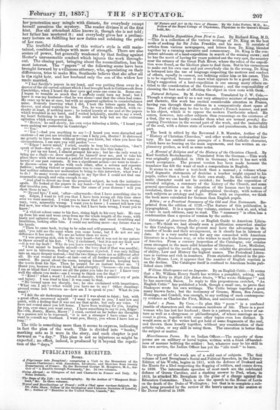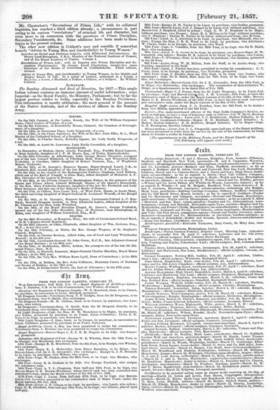PUBLICATIONS RECEIVED.
Boors.
A Pilgrimage into Dauphine; comprising a Visit tothe Monastery of the Grande Chartreuse ; with Anecdotes, Incidents, and Sketches from twenty Departnients of France. By the Reverend George M. Musgrave, M.A., Author of" A Ramble through Normandy," Sm. In two volumes.
Going Abroad ; or Glimpses of Art and Character in France and Italy. By Nona Bellairs, The Days of My Life : an Autobiography. By the Author of "Margaret Maitland," its. In three volumes.
Trarol and Recollections of Travel; with a Chat upon various Subjects. By Dr. John Shaw, Fellow of the Geological and Linntean Societies of London, Rm.; Author of "Rambles in the United States, Canada," he. Of Nature and Art is the Cure of Disease. By Sir John Forbes, M.D., he., Fellow of the Royal College of Physicians, Physician to the Queen's Household, he.
27re Franklin Expedition from First to Last. By Richard King, M.D. —This is a collection of the various writings of Dr. King on the best mode of seeking for Sir John Franklin and his men. It consists of articles from various newspapers, and letters from Dr. King, blended together by a running narrative and commentary. Dr. King is the consistent advocate of a land-expedition in search of the missing crews ; and he has the merit of having for years pointed out the very spot, the country near the estuary of the Great Fish River, where the relics of the expedition were found, as the likeliest place to find them. But in his earnestness to make out his own case and put everybody else in the wrong, Dr. King is betrayed into the use of language respecting the motives and conduct of others, equally in earnest, not befitting either him or his cause. This is to be regretted, because it mars what appears to be a good case. Dr. King's suggestion of a land-expedition is one among many others entitled to the consideration of the Government ; and the responsibility of choosing the best mode of effecting the object in view rests with them.
Natural Religion. By M. Jules Simon. Translated by J. W. Cole.— Though a strange and to us a not very attractive mixture of metaphysics and rhetoric' this work has excited considerable attention in France, having run through three editions in a comparatively short space of time. Part of this may be due to the author's French manner, and part to his object, which is to oppose the modern Pantheistic school. He enters however, into other subjects then reasonings on the existence of a God; (for we can hardly consider them what are termed proofs,) discussing Providence in the second part of the work, and the immortality of the soul, with a future state of rewards and punishments, in the third part.
The book is edited by the Reverend J. B. Marsden, Author of the "History of Christian Churches," and other works on ecclesiastical history. He has omitted some passages of a Roman Catholic character, which have no bearing on the main arguments, and has written an explanatory preface, as well as some notes.
A Manual of Religion and of the History of the Christian Church. IIy Karl Gottlieb Bretschneider. Translated from the German.—This work was originally published in 1824 in Germany, where it has met with much acceptance. The present version has been made because the translator has felt the want of such a compendium in English. It seems to us rather a text-book than a manual ; a volume whose brief dogmatic statements of doctrine a teacher might expand to his pupils, rather than a book for their own study. In fact, this curt dogmatic character could not be avoided ; for besides the exposition of revealed religion, a summary* of the history of the Church, and some general speculations on the education of the human race by means of revelation, there is a view of philosophical theology, with notices of such subjects as ontology and logic. Even with an expositor, we think the book more calculated for German than English pupils.
Biblia ; or a Practical Summary of the Old and New Testaments. Reprinted from the edition of 1728.—The feature of this publication is typographical. It is a square tiny volume, curious to look at, and, what is rare in such editions, easy to read. The " summary " is often less a condensation than a species of version by the author.
Catalogue of American Books; or English Guide to American Liters.ture.—We think we had already seen a publication somewhat similar to this Catalogue, though the present may have the advantage in the number of books and their arrangement, as it clearly has in lateness of date. It is a very useful work for any one connected with American literature in a business way, or who wishes to mark the literary progress of America. From a cursory inspection of the Catalogue, our cousins seem strongest in the snore solid branches of literature. Law, Medicine, Science applied to the useful arts, appear to exhibit the greatest amount of ability, Law and History the highest names. The Periodical Literature is various and rich in numbers. From statistics adduced in the preface by Messrs. Low, it appears that the number of English reprints is on the decline. The Catalogue itself is confined to American books published since 1808.
William Shakespeare not an Imposter. By an English Critic.—It seems that a Mr. William Henry Smith has written a pamphlet, asking, with Mistress Kitty in High Life Below Stairs "Who wrote Skikspur ? " and he has answered, Bacon. In reply to tLukreposterous crotchet, "Au English Critic' has published a book, though a small one, to prove that Shakspere wrote his own writings. The *tic brings together a good many known facts ; but the testimony of Greene, Meres, Ben &union, Hen:nage, and Condon, was enough, to say nothing of such contemporary evidence as Charles the First, 'Milton, and universal consent.
Isabel a Poem. By Crex.—In plan this " poem " is a confused jumble of characters and the common incidents of life. There is a poor woman who has lost her husband ; there is a pattern man, a lover of nature as well as a clergyman or philanthropist, of whose marriage an account is given, together with some other topics even less distinct. It would seem as if the writer had got hold of some fragments of the real, and thrown them loosely together, without any consideration of their artistic value, or any skill in using them. The execution is better than the subject or matter.
Miscellaneous Poems. By an Indian Officer.—The majority of these poems are on military or naval topics, written with a frank offhandedness of manner befitting the soldier : but, whatever may be his skill in his own service, the Indian Officer has yet the "idle trade" to learn.
The reprints of the week are of a solid cast of subjects. The first volume of Lord Brougham's Social and Political Speeches, in the Library Edition of his Works, begins in 1811, with the defence of Drakard and the Hunts for a libel respecting the flogging of soldiers, and comes down to 1839. The intermediate speeches of most mark are the celebrated defence of Queen Caroline, and a slashing answer to Peel, when, in 1819, he attacked Mr. Brougham in the guise of a charge against the Education Committee. There is also the speech to the House of Lords on the death of the Duke of Wellington; but that is to complete a subject, being preceded by the review of the hero's career in the oration at the Dover festival in 1839. Mr. Chesterton's "Revelations of Prison Life," with its collateral inquiries, has reached a third edition already ; a circumstance in part owing to its curious "revelations" of criminal life and character, but even more to its connexion with the questions of Prison Discipline, Secondary Punishments, 8cc. Some additions have been made to these topics in the present volume. The other new edition is Cobbett's racy and sensible if somewhat homely "Advice to Young Men and (incidentally) to Young Women." Speeches on Social and Political Subjects, with Historical Introductions. By Henry Lord Brougham, F.R.S., Member of the National Institute of France, and of the Royal Academy of Naples. Volume I.
Revelations of Prison Life; with an Inquiry into Prison Discipline and Secondary Punishments. By George Laval Chesterton, twenty-five years Governor of the House of Correction at Coldbathfields. Third edition, revised.
Advice to Young Hen, and (incidentally) to Young Women, in the Middle and Higher Ranks of Life. In a series of Letters, addressed to a Youth, a Rooheloa a Lover, a Ilusband, a Father, a Citizen, or a Subject. By William Cobbett.



























 Previous page
Previous page